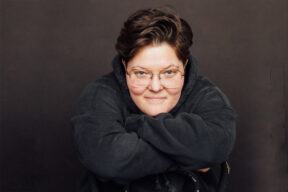By Angela Serednicki
For better or worse, your childhood plays a significant role in shaping who you are today. Even if you didn’t experience something difficult in childhood—such as watching your parents go through a bad divorce—many psychologists believe our subconscious remembers everything we experienced in those early formative years.
Swiss psychologist Carl Jung first coined the inner child concept, highlighting that we unconsciously absorb insights into relationship dynamics during our early childhood. These lessons profoundly influence our approach to relationships, conflict resolution, self-perception, and personal growth throughout our lives.
What is an Inner Child?
Simply put, those who practice inner child work often imagine a younger version of themselves, engaging in therapeutic exercises to heal and better understand their past experiences.
An article on the therapy platform Better Help, explains: “The term inner child is often used to describe the connection you have within yourself to your child self and your childhood memories.”
Just like your inner child comes to light in happy moments like playing Barbies with your niece, your inner child can also impact how you feel and react when you’re frustrated or angry.
Of course, no parent or childhood is perfect. As reported in Lumo Health, “Even if your home life was largely happy, no person’s younger years are completely free of confusion, disappointment or upset. And while you might have worked through some of those issues already, others may still haunt you without realizing it.”
What is Inner Childwork?
Samuele Bariani, a registered psychotherapist at Vaughan Counselling and Psychotherapy, explains that inner child work is about acknowledging and connecting these feelings with the original childhood experiences. “With consistent practice, you can become skilled at making the link to the past and letting go of a lot of pain you’ve been carrying,” he says. Ultimately, this will help you reframe your thoughts and develop healthier habits.
Bariani recommends asking yourself these questions to see if inner child work could benefit you:
- Are you a people-pleaser who avoids conflict?
- Do you struggle with trusting others?
- Are your boundaries problematic – either too weak or too rigid?
- Is expressing difficult emotions, like anger, a challenge for you?
- Do you have a fear of being abandoned?
If you answer “yes” to one or more of these questions, these are the five signs it’s time to start inner child work.
How to Start Healing Your Inner Child
Journaling is one of the best ways to connect with emotions. In addition to reducing anxiety, writing can be a transformative tool for embracing your inner child. Canadian relationship therapist Kimberly Moffit recommends answering these prompts to get started:
- Would you consider yourself a “people-pleaser?”
- Can you think of a time when you felt like you were “too much” for the people around you?
- Can you think of any areas of your life where you might benefit from setting stronger boundaries?
- What is one negative belief about yourself, and what would you rather believe instead.
Writing a letter to your inner child is another way to reframe challenging thought patterns from the past. Try addressing past hurts, sharing love and support, and showing gratitude for what you’ve been through. After all, it can feel easier to extend compassion to a younger kid than to forgive yourself.
4 Signs Your Inner Child Is Healing
How do you know if your inner child is healthy? According to Bariani, one sign is having a supportive group of loved ones who make you feel happy and valued. Another indicator is being able to find inner strength and inner peace when facing life’s challenges. Learn more about these signs your inner child is healing and healthy:
You Start Believing In Yourself: As your inner child heals, you may still experience self-doubt, but it no longer controls your actions. “You’ve learned to give yourself permission to make mistakes, face rejection, and even screw up,” Bariani says.
You’re More Confident in Communication: One sign that you’re healing your inner child is that you’ve come to appreciate the need for uncomfortable conversations. “You understand this type of conflict doesn’t end relationships; resentment does,” he says. By facing these difficult discussions, you foster healthier connections with others and create opportunities for growth.
You Handle Emotions Better: Another sign that your inner child is healing is recognizing how you respond to your typical triggers. “Coping strategies like mindfulness and meditation help you return to a calmer, grounded place after something upsetting happens,” he says.
You’re Not Afraid of Your Emotions: A key healing component is giving yourself permission to feel deeply. “Now you give yourself permission and the space and grace required for feeling because you know this is essential to moving forward and letting go.”












